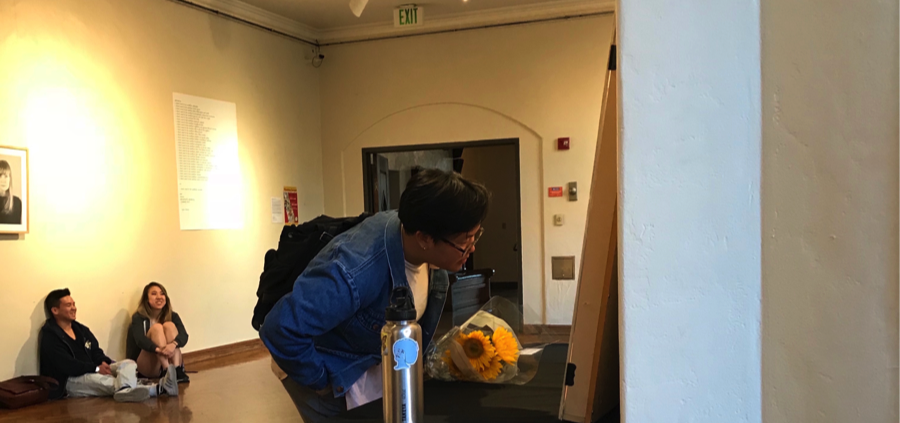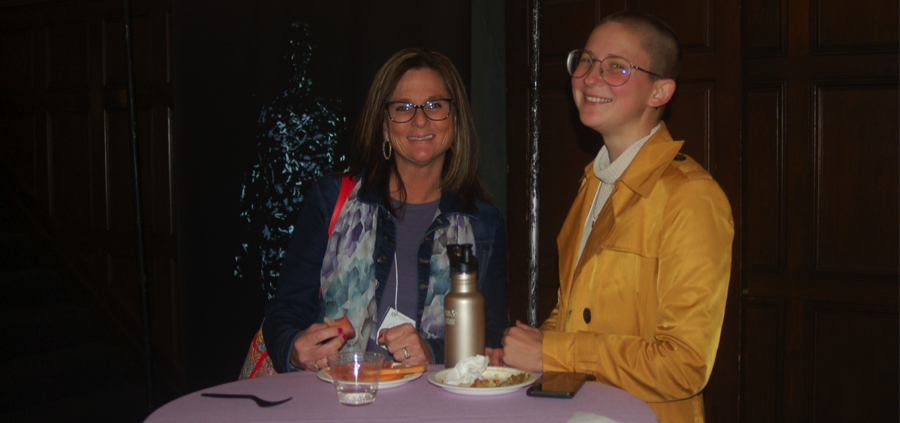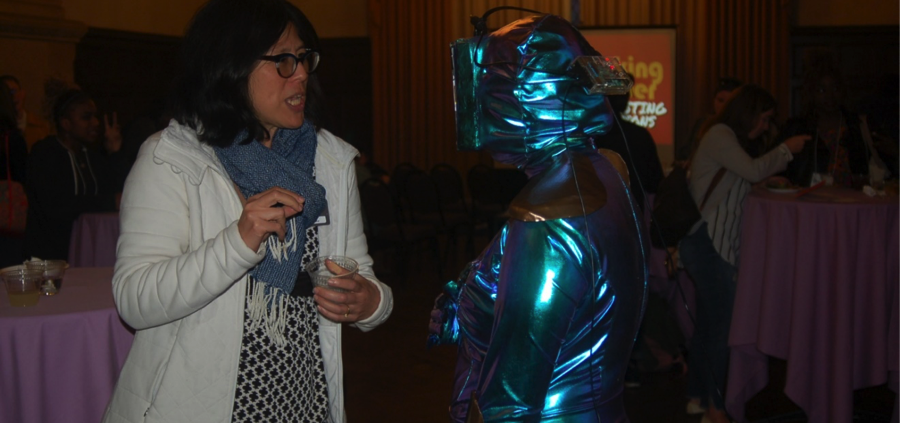An Evening of Art, Health, and Thinking Gender
Art walk participants collaborated on haikus that explored the question “what do women need to be healthy?” This example was written by Jackie Curnick and Sheila Maingi.
By Drew Westmoreland
Thinking Gender, now in its’ 28th year, is an annual graduate student research conference organized by the UCLA Center for the Study of Women (CSW) that features original student research on gender and sexuality. This year’s conference theme, Pre-existing Conditions, focused on connections between health and gender in the context of on-going discussions about gender-focused health and healthcare.
Visitors enjoy viewing and interacting with visual art on display at the Kerckhoff Art Gallery.
Academic graduate student research presentations—including panels and posters—have been the staples of past and present Thinking Gender conferences, highlighting research being done by graduate students from UCLA and beyond. This year, however, we wanted to do something new, and we incorporated the first-ever Thinking Gender Art Exhibition into our proceedings. This week-long exhibition was held in Kerckhoff Gallery from February 23rd to March 2nd. The artists featured in our Thinking Gender, Pre-existing Conditions Art Exhibition used artistic expression to further conversations about health and well-being. To celebrate this artistic exploration of health—and the successful completion of our first day of our conference—we invited presenters, faculty, students, and other guests to join us for an Art Reception and Film Screenings networking event on the evening of March 1.
We partnered with a number of UCLA organizations to extend this event’s local impact. The UCLA Art and Global Health Center kicked off the evening with a performance piece called Sexophonic Choir, which invited volunteers to vocalize lessons about sexual health. Then, they led an interactive art walk as we transitioned from the main conference venue at the UCLA Faculty Center to Kerckhoff Grand Salon and Gallery. At Kerckhoff, we were joined by our partners from the UCLA Cultural Affairs Commission and the UCLA Art|Sci Center, who helped us curate the exhibit and connect with students from across campus.
 Conference presenter Sav Schlauderaff and guest. In the background: inter-I, a digital installation by Elí Joteva
Conference presenter Sav Schlauderaff and guest. In the background: inter-I, a digital installation by Elí Joteva
CSW Director Rachel Lee interacts with Kit Kirby, who is performing The Chameleon Spacesuit: Autism in Women and Girls
Our exhibition included a photography exhibit (Guarded) by Taylor Yocom, featuring images of women and the objects they would use to defend themselves from sexual assault; a fiber art piece (No.Stop.Help.) by Sarah Fahmy about sexual assault victim blaming; public health-themed poetry (data entry and statistics) by Uyen Hoang; and abstracted photographs of body skin impressions (Suspicious Warping: Close to the Skin) by Cecily Fergeson. We also featured digital installations and experimental art pieces. One life-size, digital installation piece (inter-I) by Elí Joteva explored physical body movement through light reflections and refractions off water. Three other pieces offered attendees an interactive experience to expand understanding of neurodiversity and mental health. Breathe, by Christina Curlee, was a video game that let players experience life with an anxiety disorder; Kristin McWharter’s TugTug examined the gendered aspects of competition and criticism; and Kit Kirby‘s The Chameleon Spacesuit invited viewers to engage with the artist, who was clad in a robot-like costume meant to represent the challenge of interacting with the world as an autistic woman. Our two films showcased untold stories: Arielle Bagood’s film provided commentary on queer Filipino college student’s mental health while Jackie Curnick’s expored health as motivating factor for Alaskan Natives’ environmental justice activism. The art show told stories designed to expand and challenge how people conceptualize health. From women Guarded and prepared to defend themselves from sexual assault, to the relative intimacy of data entry and cold perceptions of statistics, to alien feelings of being unable to express yourself emotionally (The Chameleon Spacesuit), our artists tackled topics of mental and sexual health, reproductive justice, and body imagery as art and health collided.
Drew Westmoreland is the 2018 Thinking Gender Conference Coordinator. She is a doctoral candidate in Epidemiology at UCLA’s Fielding School of Public Health. Her dissertation focuses on sexual health and sexually transmitted diseases, and she has strong research interests in issues related to women’s health.



